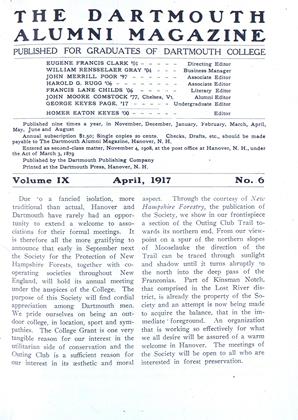Last October a notable company gathered in St. Louis to legislate for the Protestant Episcopal Church in; the United States. Bishops, presbyters, laymen — as representatives of this great branch of the Christian Churchlabored for three weeks in discussion and conference and legislation.
To what extent Dartmouth was represented among the presbyters and lay delegates I do not know. There must have been many of her sons in this lower chamber of the convention, but in the upper house, the house of bishops, there were, at least, two Dartmouth men of whom it is well to be reminded. I refer to Ethelbert Talbot of the class of '70, and Walter Taylor Sumner of the class of '98. Talbot was made bishop in 1887 and for twelve years had charge of the missionary diocese of Wyoming and Idaho. In 1898 he was elected bishop of Central Pennsylvania, and seven years later when this diocese was divided into the two jurisdictions named" Harrisburg and Bethlehem, he became the official head of the latter. Sumner about two and a half years ago became bishop of the diocese of Oregon.
Bishop Talbot has been in the Episcopal office so long and has by his official duties been called into so many sections of the country, that most Dartmouth alumni have met or heard him, and . many have done so repeatedly. As bishop of a western missionary field and working to a large extent among frontier conditions he made a marked impression on the eastern congregations, which he addressed, and he became favorably known by many persons who never heard him preach, through My People of the Plains, published a dozen years ago or more. In this book he recounts most vividly and interestingly his experiences with all sorts and conditions of men in those regions of the miner and cowboy.
Talbot was always energetic, resourceful, sympathetic—a very vital man. This he was as a student in college days, and still is as he approaches the age when, clergymen and teachers are expected to retire. We heard him a few days ago here in Hanover, as College Preacher, and saw that his force had in no degree abated. He has been an honor to the College and a most loyal son.
To the writer who knew them both so well in college the name of Talbot is, in this connection, linked inextricably with that of his classmate Leonard. Their careers ran parallel in a very remarkable manner. They were boys together in Fayette, Missouri; came to college together; studied together for the ministry ; solemnized each the marriage of the other; were made bishops within less than a year apart; and were both assigned to western missionary fields. Leonard was bishop of Utah until his death in 1903.
Walter Taylor Sumner had attracted wide notice by his work on the Vice Commission of Chicago. At this time he was Dean of the Cathedral of S. S. Peter and Paul (Protestant Episcopal) of that city. He was also a very active member of the Board of Education. In 1915 he was consecrated bishop of Oregon. His residence is in Portland. He seems to have established a reputation as an indomitable worker and as an exceptionally efficient administrator, with much power of initiative and the ability to cooperate with other workers and to get others to cooperate with him.
Each of these Dartmouth bishops has recently been honored by their associates in the Episcopate. Bishop Talbot is serving as Chairman of a very important Commission on Church Unity, the purpose of which is to secure cooperation from all branches of the Church the world over towards creating a world wide conference on Unity, an enterprise now unhappily retarded by the great war.
Bishop Sumner was invited the past autumn to address the diocesan convention in San Francisco. I believe his subject was Social Reforms.
Forty or fifty years' ago a very considerable proportion of each graduating class at Dartmouth studied for the ministry — one-fourth, or one-third being no extraordinary number. Of the fifty-one men who were graduated from the college proper in 1870, twelve studied for the ministry.
One gets the impressions that in these days the ratio is so small as to shame one from attempting to calculate it. Taking two comparatively recent classes at random, I find that in the earlier instance, the class of 1904, five out of one hundred and twenty-seven entered the ministry; of the later class, 1913, I cannot find that more than two were headed toward that vocation in 1915; and this class numbered at least two hundred and twenty. What colleges, I wonder, are furnishing candidates for this supremely important calling? Some must be doing much more than Dartmouth towards maintaining the early Dartmouth ideal. Just now we are hearing much about education for service. Dartmouth men are urged to make this their ideal. Why should they not in increasing numbers adopt the Christian ministry as pre-eminently a career of service ?
Two DARTMOUTH BISHOPS
 View Full Issue
View Full Issue
More From This Issue
-
 Article
ArticleANNUAL MEETING OF THE DARTMOUTH SECRETARIES ASSOCIATION
April 1917 By Eugene D. Towler '17, W. J. TUCKER. -
 Article
ArticleTHE UNDERGRADUATE MONTH
April 1917 -
 Article
ArticleDARTMOUTH'S MILITARY POLICY
April 1917 -
 Article
ArticleDue to a fancied isolation,
April 1917 -
 Article
ArticleMARCH MEETING OF THE TRUSTEES
April 1917 -
 Article
ArticleFRANCE HONORS MR. AND MRS. TUCK
April 1917









